- Columbus City Schools
- ESSER Funds Home
Elementary and Secondary School Emergency Relief (ESSER) Funds
-
Elementary and Secondary School Emergency Relief (ESSER) is a federal program that provided funding to states and school districts during the COVID-19 pandemic. This emergency funding is designed to help address educational issues arising from the pandemic by providing schools with resources to prevent, prepare for, and respond to the COVID-19 crisis. These funds provided crucial support to students most impacted by the pandemic.
The ESSER funding program is available until September 2024.
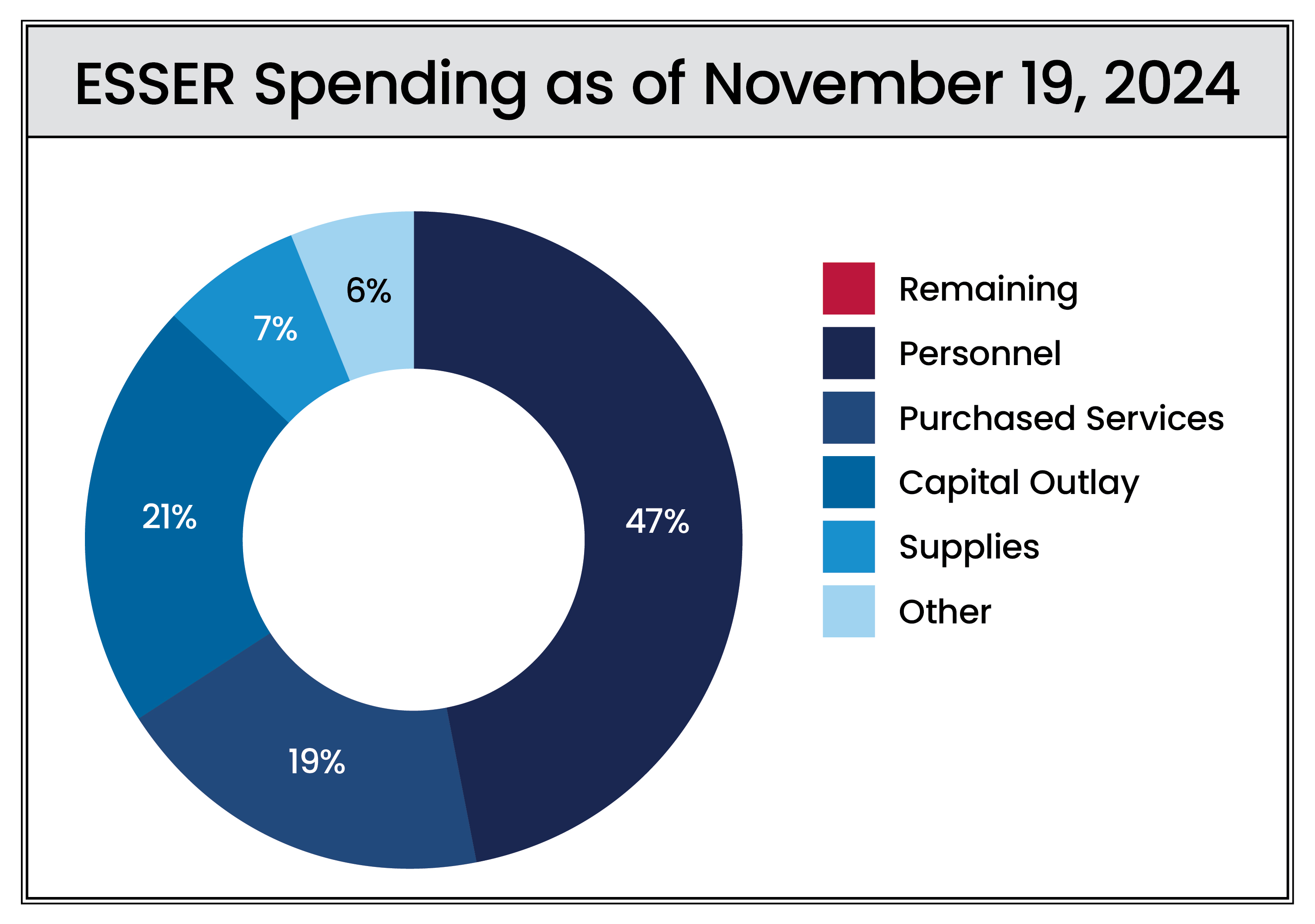
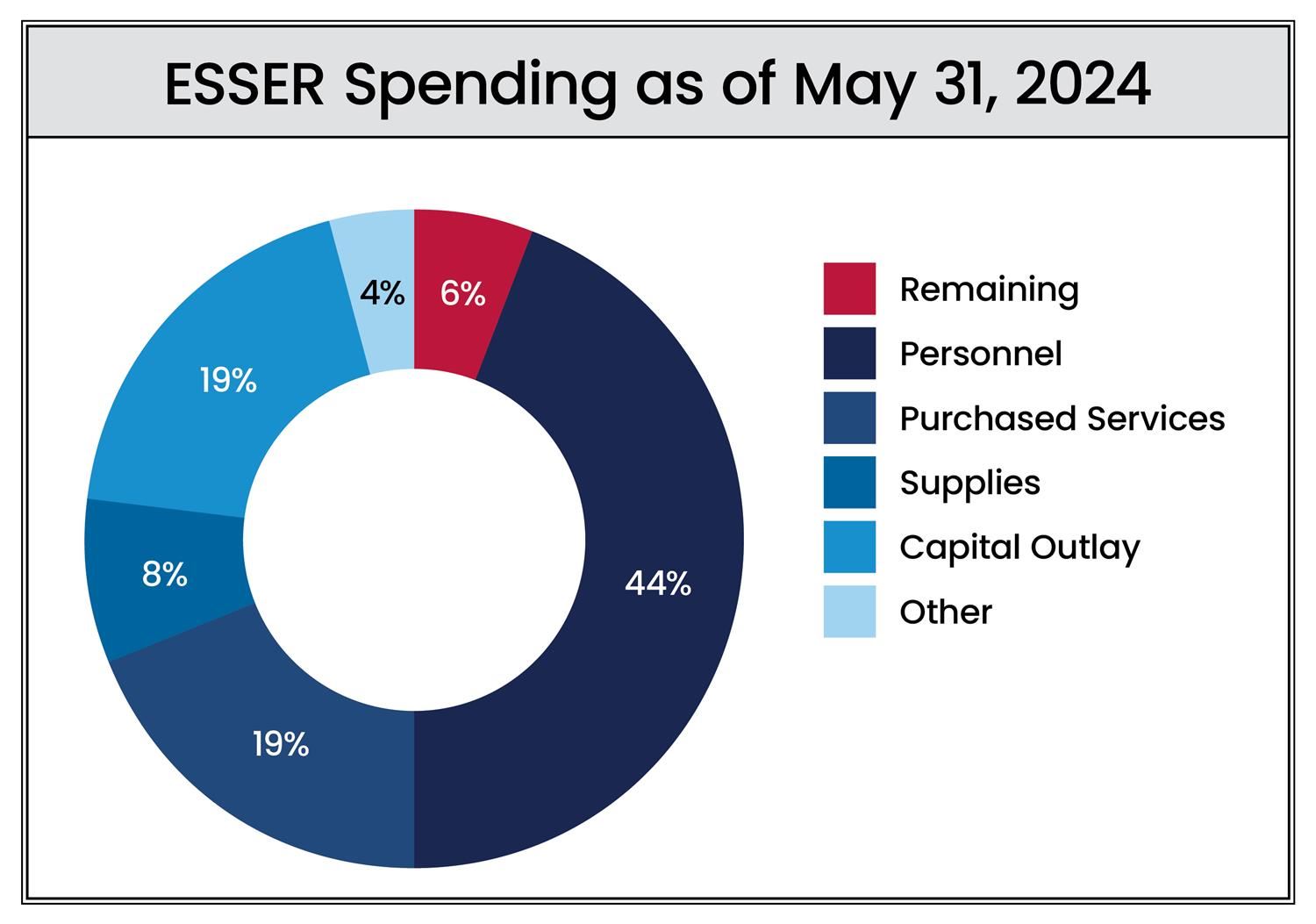
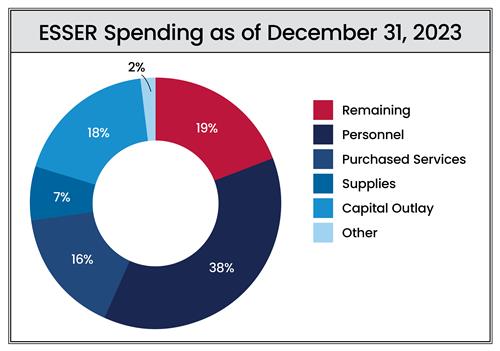
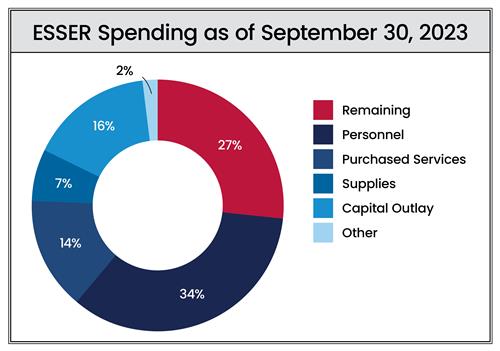
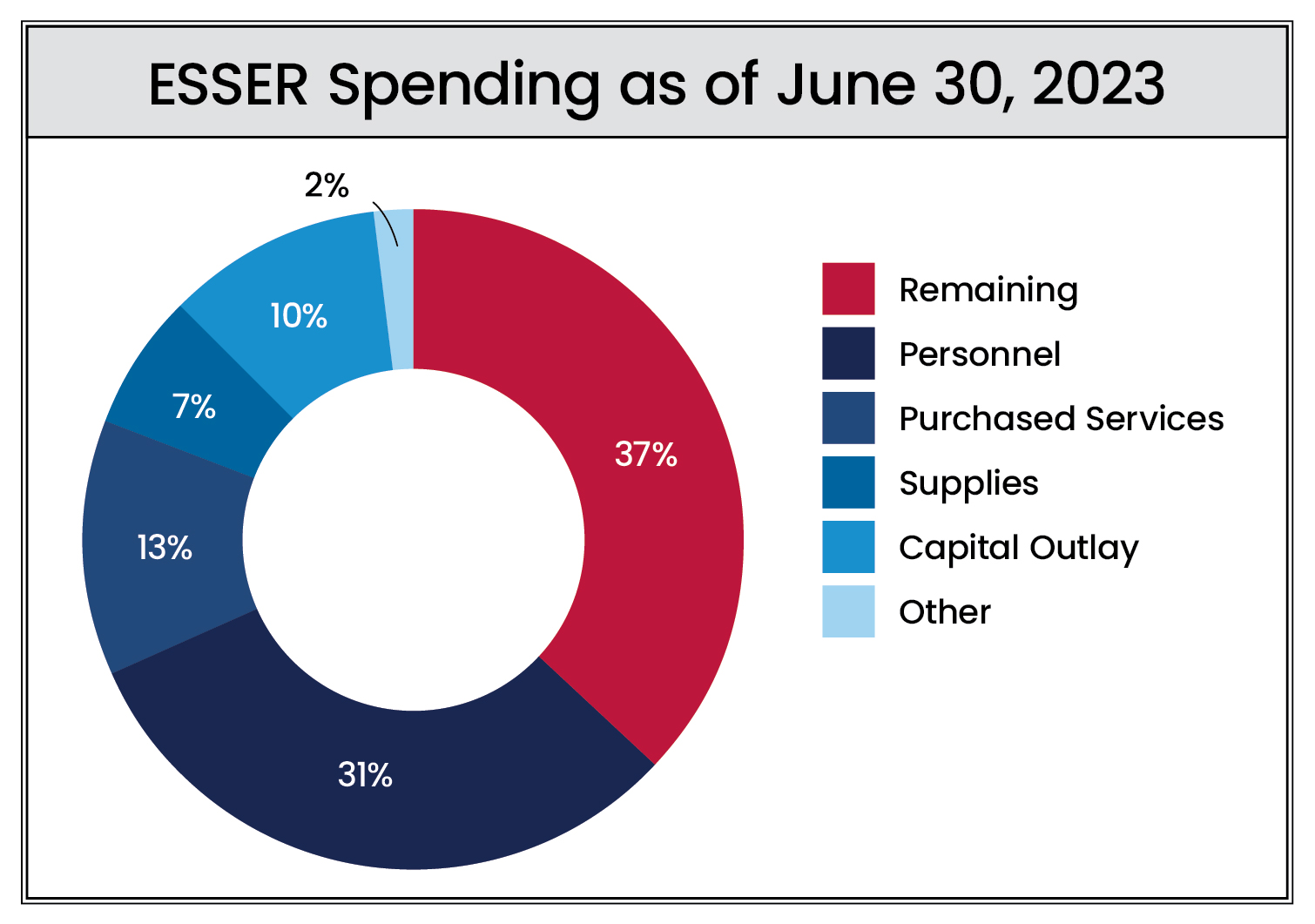
-
What has the Personnel money paid for?
- Instructional Coaches
- School Counselors
- School Social Workers
- Administrators
- Instructional Assistants
- Custodians
- Safety and Security Specialists
- ESL Interpreters
- Social-Emotional Support Specialists
- HR Recruiters
- Labor Relations support
- Matriculation Coaches in High Schools without Title I funding
- Building Substitutes
- Unemployment claims
- Recruitment and retention funds
- Wellness Week
- Additional supplemental lunchroom contract for every elementary school to allow for social distancing by offering more lunch times in each elementary school
- Region 3 Family Engagement Saturdays
- Year one BlendEd online school
- Extended time for teachers who serve as mentors to individuals as they explore career opportunities in the teaching profession
- Pilot programs in Finance and Engineering at Beechcroft High School
- Enrichment programs for schools without Title I funding
- Summer programs for students with complex needs
- Additional PAR consultants to serve the needs of new teachers who joined the district during remote instruction
- PD for school leadership teams to update mission; Vision and improvement plans during pandemic and upon return to in-person instruction
- TACT Concussion Training
- Summer Experience K-12
- Coordination of summer and extended learning opportunities
- Continuity of operations planning for department teams and schools
- Extended time for teachers to transition to remote learning for students
- Extended time for teachers to develop virtual courses on using technology and the internet safely, responsibly and ethically
- Extended time pay for teachers-additional breakfast and lunch sections to allow for social distancing
- Extended time for teachers to develop SEL lessons and resources for students
- Extended time for teachers to write curriculum content in the CANVAS online learning management system
- Extended time for teachers to develop Portrait of Graduate curriculum
- Extended time for teachers to provide high-dose tutoring and clubs
- Extended time for staff to provide compensatory time for students with IEPs who missed their required services during remote instruction
- Extended time for teachers and school leaders to learn about acceleration, intervention and remediation
- Extended time for staff to stay with students when buses were late due to shortage of drivers
- Extended hours for teachers serving increased number of non-grads
- Funding to support increased enrollment in college credit plus
note- this is not an exhaustive list of all expenditures
-
What has the Purchased Services money paid for?
- SchoolLinks graduation tracking platform
- Zoom licenses
- Platform for online learning
- CASEL review of district readiness for SEL programs
- Educators Thriving SEL for teachers
- Additional IT techs
- Routing software for transportation
- Curriculum Coaching
- AttendanceWorks
- Waterford upstart program to assist PreK and K students with readiness gaps
- Proximity Learning to provide a blended learning solution for foreign language
- Graduation support programs
- After school programs
- City Year,
- Communities in Schools
- AVID
- Korda, platform for online tutoring
- Contracted services to supplement nurses who track and report COVID-19 cases
- PDK consultinging and policy implementation in response to curriculum review
- Driven Foundation
- Six Sigma Process Improvement training
- Additional warehouse storage
note- this is not an exhaustive list of all expenditures
-
What has the Supplies money paid for?
- Chromebooks
- Clear Touch digital monitors for classrooms
- Disaster response kits
- Storage of emergency food
- Hotspots
- Digital instructional resources for students and staff
- Headphones for remote teaching and learning for students and staff
- Masks for students to use during band
- COVID-19 safety protocol signage translated into multiple languages, plexiglass, sanitizer, HEPA filters & fans
- Resources for secondary music teachers
- Updated vision screening resources for nurses
- Diverse library books purchases
- Literacy manipulatives to support deaf students
- ELA honors 9 & 10 textbooks to accommodate the increasing number of students registering for those courses
- Soundtrap cloud-based audio digital platform to enable students to create music and podcasts
- Instructional resources for classrooms
- Caps, gowns and diploma covers for seniors
- Software to allow hands-free processing of required student, staff and community forms
- Scanners for nurses
- Software to allow district to accelerate the digitization of student records
note- this is not an exhaustive list of all expenditures
-
What has the Capital Outlay money paid for?
-
HVAC in remaining schools that did not have air conditioning
-
Repairing and upgrading ventilation systems
-
Roofing
-
Classroom furniture
-
Flexible seating for middle school cafeterias and libraries
-
Upgrades to high school computer labs to support increased CTE programming
-
Playground renovations
note- this is not an exhaustive list of all expenditures
-

CCS Established Four Priorities for ESSER Funds
-
Priority 1: Learning Recovery and Supports for Schools
Social-Emotional Learning and Support:
- Hire additional school counselors to allow for a dedicated full-time school counselor in every school by Fall 2022.
- Planned cost - $42 million, $90 per student.
- Program Supports to improve student attendance which has been impacted by the pandemic.
- Whole-Child supports to focus on Restorative Practices in schools.
Curriculum and Accelerated Learning:
- Career Technical Education classes for middle school: two more CTE classes - Family Consumer Science and Small Engine Repair - will be added to the curriculum at Hilltonia MS next year.
- One of the priorities in the CCS Strategic Plan is strong learning communities in every region. By expanding CTE programs districtwide at middle schools like Hilltonia, the District is providing more flexible course offerings that improve student learning experiences.
- Columbus Online Academy is reaching multiple stakeholders through our unique online learning process. We are able to provide quality teacher-driven instruction across multiple virtual platforms and materials.
- Enrollment for 2021-2022 = 600.
- Enrollment expected for 2022-2023 = more than 800.
- Planned cost $4.7 million, $101 per student, with a plan to continue after ESSER funds are exhausted.
- LETRS Reading and Training for Elementary teachers, administrators
- $19 million planned cost, $409 per student.
- Literacy Specialists and Support - Teachers trained to provide evidence-based interventions to support literacy instruction.
- Instructional coach in every building supports strong instruction in classrooms
Family and Student Engagement:
- Family Ambassadors for every school. We currently have 120, including 12 bilingual ambassadors, with a goal of 130 Family Ambassadors.
- Planned cost - $7 million, $151 per student.
- Bilingual Engagement Liaisons - Trained bilingual liaisons will support the work done in our schools by Family Ambassadors, focusing on the needs of English learners and their families.
- We have 11 liaisons to date, who speak Spanish, Somali, Arabic, Nepali, Somali Mai Mai, or French/Kinyarwanda with a plan to add another who speaks Pashto/Dari and can assist with Afghan refugees.
- Vulnerable Youth Advocates - Increase services and supports provided to homeless and vulnerable youth.
- Hire additional school counselors to allow for a dedicated full-time school counselor in every school by Fall 2022.
-
Priority 2: Infrastructure Improvements and Operations
Ventilation Upgrades
- ESSER funds have been allocated to upgrade HVAC systems in the remaining schools without building-wide air conditioning.
- 13 HVAC building projects are ongoing this summer:
- Broadleigh ES, Colerain ES, Como ES, Fairwood ES, Johnson Park MS, Maize ES, North Linden ES, Valleyview ES, Woodward Park at Walden MS, West Broad ES, Westgate ES, Westmoor MS, and Yorktown MS
- 2 HVAC building projects have been delayed to Summer 2023 due to supply chain issues:
- CAHS and Hubbard ES
- 1 HVAC building project is included in Phase 4 of the FMP:
- Mifflin MS
- 13 HVAC building projects are ongoing this summer:
Auditorium Upgrades
- Updates of enhanced audio-visual equipment and technology for socially-distanced and blended learning environments.
Additional Custodians
- 52 custodians hired with a goal of 68 this year and another 45 next year.
- Investment to date $1,881,394 - planned through summer 2022 - $3,559,101
- ESSER funds have been allocated to upgrade HVAC systems in the remaining schools without building-wide air conditioning.
-
Priority 3: Technology
Laptops, Chromebooks, and Computing Devices
- Every student to have their own device, and all staff to have the technology needed to carry out their work.
- Currently more than 46,000 active student Chromebooks.
- Planned cost $18 million, $387 per student.
Hot Spots and Broadband Access
- Additional internet hot spots and broadband technology to ensure all students are able to access online resources at school and at home.
- CCS has distributed hot spots to more than 4,000 families to date.
-
Priority 4: Development and Professional Learning
Learning Technology
- A new team of learning designers and educational specialists will roll out a PK-12 curriculum repository that will ensure teachers, students, and families can benefit from high-quality curriculum and resources in a one-stop-shop.
- Canvas course writing has begun, and the platform is being piloted.
- Canvas will be implemented for the 2022-2023 school year for all core content areas.
- Planned cost $5 million, $108 per student.
- Training specialists will provide professional development for all 9,000 teachers and staff across the district.
- Training for Classified staff has begun with nearly 1,000 participants.
- Planned cost $1 million, $22 per student.

